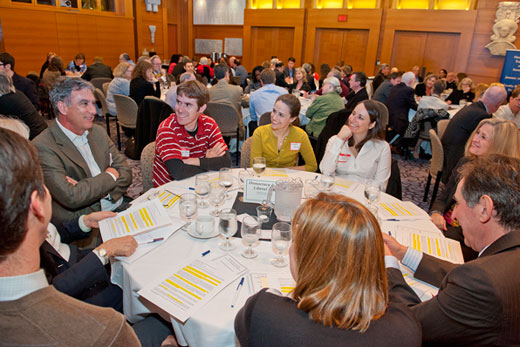"The Liberal Arts and the Future of the University" was the topic that provided food for thought for the Bill and Carol Fox Center for Humanistic Inquiry's 11th Faculty Response Forum dinner on Jan. 25.
The FCHI – a hub for humanities research and teaching at Emory that encourages intellectual community and scholarship across disciplines – created the annual Faculty Response Forum a decade ago as a way for the community of humanistic thinkers to connect and address a variety of issues of local or national significance.
"This year the university as a whole is re-examining its understanding of the liberal arts, and what it means to be both a keeper of traditional scholarship and a leader of innovative thinking – humanistic, scientific and otherwise," said FCHI Interim Director Walter Reed about the selection of this year's topic.
"We dare to hope that the liberal arts do indeed have a pride and place at Emory and at other great universities around the country and around the world," he said.
"We dare to hope that humanistic thinking is a vital part of that future."
At many tables, faculty were joined by staff and graduate students to add further cross-pollination of perspective to the stimulating conversations and intellectual creativity aimed at the menu of topics, which ranged from "Democracy and the Liberal Arts" to "The Legitimacy of the Liberal Arts in the 21st Century University" to "Health Care, Liberal Arts and Social Responsibility."
At a table devoted to "Constructing a 21st Century University," co-moderators Carole Meyers and Steven Kraftchick asked the group to consider the question of applied knowledge in today's liberal arts education, at a time when the value of higher education has come under public scrutiny.
"It's such an enormous challenge to think about how you articulate the value of a liberal arts education," said Meyers, senior director of facilities and IT for Emory College.
"Learning for its own sake is something that the liberal arts has always been about, and I think it's getting compromised," said Thomas Flynn, Samuel Candler Dobbs Professor of Philosophy.
"Why do universities come into being?" asked Kraftchick, a Candler School of Theology associate professor. "It's essentially to access information. So 500 or 700 years ago, that's where you could deposit knowledge bases and get to them quickly in conversation. Now, the technology actually moves in the other way; it decenters where you have to be to access information."
That raises questions, he said. "And if we can't answer those questions, people won't come. We almost have to flip the technology … to help us ask why we want to cluster, why we want to have face-to-face conversations, what kind of spaces they are going to happen in?"
"At this time and in a country that is historically anti-intellectual and doesn't understand higher education as a segmented market, and thinks of education as perhaps synonymous with job training, how do we explain ourselves as something more than vague statements about self-development?" said Meyers.
"And one more thing we have to justify is the major factor of cost," added English professor Laura Otis.
The conversation at the table turned to what makes Emory distinctive, and what should a liberal arts education at Emory look like.
"It's an emotional experience to study here," said Otis. "People hang outside the library talking to each other, and the friendships you make, you keep all your life. I think [our students] learn as much from their interactions with other students as they do from the courses they take."
Have natural gathering places on campus been "engineered out?" asked Kraftchick.
"If I were changing things, one of the things I'd start doing is ask questions about architecture, not just in terms of does it fit the mold of what we need, but is it a livable space? Does it engender the types of conversations we hope students will have?" Kraftchick said.
"It's important for us to be self-critical," said Flynn.
The conversations continued well past dinner, branching off into different directions, raising new questions. The intellectual buzz and energy in the room was palpable.
For Kevin Corrigan, Samuel Candler Dobbs Professor in the Graduate Institute of Liberal Arts, the Faculty Response Forum provided "wonderful insight and a fascinating look at the different models of liberal arts." Corrigan co-moderated a table looking at "The Liberal Arts and the Professional Colleges in the Modern University." "With a wide range of perspectives, from law to medicine, we were able to have a wonderful discussion."
According to FCHI Program Coordinator Amy Erbil, the 11th annual forum saw 100 percent participation, and having Bill and Carol Fox in attendance further enriched this year's event.

